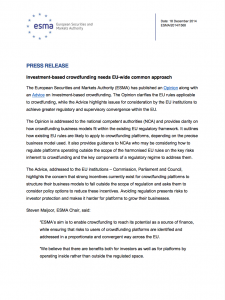ESMA issues Q&A on anti-money laundering and investment-based crowdfunding platforms
July, 1, 2015, Originally posted by ESMA,
the European Securities and Markets Authority (ESMA) issued today a Questions and Answers (Q&A) solicitation in order to promote the sound, effective and consistent application of rules on anti-money laundering and terrorist financing to investment-based crowdfunding platforms. The Q&A aims to promote common supervisory approaches and practices in the application of anti-money laundering rules to investment-based crowdfunding. It provides responses to questions posed by national competent authorities in the course of ESMA’s work on investment-based crowdfunding, drawing on expert input from the Joint Committee sub-committee on Anti-Money Laundering. The Q&A is aimed at national competent authorities to support them in ensuring that their supervisory approach is effective, taking into account the characteristics of and risks associated with different aspects of investment-based crowdfunding platforms.
Not all invstment-based crowdfunding platforms have the same regulatory status. Some are within the scope of the Markets in Financial Instruments Directive (MiFID); others fall within the optional exemption provided by Article 3 of that Directive where they may be regulated under specific national regimes; others may fall outside the scope of MiFID and of those some are regulated under national law, while others are not. There are also other EU rules potentially relevant to investment-based crowdfunding platforms, such as the Payment Services Directive (PSD).
Those platforms which operate within MiFID are automatically subject to rules designed to combat money laundering and terrorist financing under the Third Anti-Money Laundering Directive (3AMLD). ESMA has sought to clarify the status of the other platforms, by analysing the potential risks and issues arising in different cases and their treatment under the applicable EU rules.




